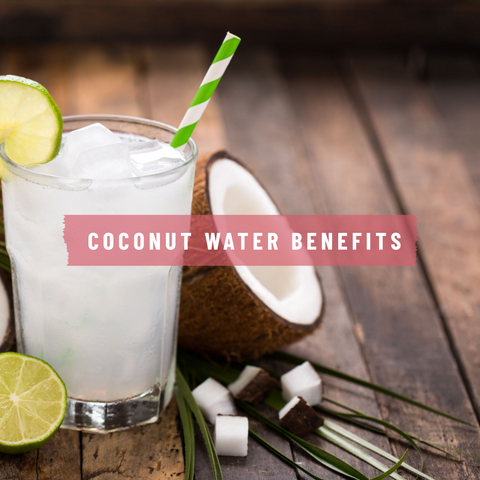The Benefits Of Coconut Water For Hydration And Post-workout Recovery
Have you ever wondered why coconut water has become a popular choice among athletes and fitness enthusiasts?
This natural beverage, derived from the liquid inside green coconuts, has gained widespread attention for its numerous health benefits, especially when it comes to hydration and post-workout recovery. 
But what makes it stand out from other drinks?
Let's dive in and find out!
Natural Hydration and Electrolytes
Hydration and Athletic Performance
Staying hydrated is essential for maintaining peak performance during physical activity.
When you exercise, your body loses fluids through sweat, which can lead to dehydration if not replenished.
Dehydration can cause fatigue, decreased coordination, and even muscle cramps, impacting your performance and overall health.
Electrolytes in Coconut Water
Coconut water is packed with essential electrolytes like potassium, sodium, magnesium, and calcium, which help regulate fluid balance in the body.
These minerals play a vital role in muscle function, nerve signalling, and maintaining the right pH levels in your body.
Coconut water provides a natural source of electrolytes, making it an excellent choice for rehydration.
Related: These Are the 10 Most Important Vitamins for Muscles
Post-Workout Recovery
Muscle Repair and Growth
Intense workouts can cause microscopic damage to your muscle fibres, requiring proper nutrition for repair and growth.
Coconut water contains essential amino acids, which are the building blocks of protein and play a crucial role in muscle repair.
Drinking coconut water after a workout can help speed up the recovery process and aid muscle growth.
Related: The Best Post-Workout Habits for Recovery
Antioxidant Benefits
Free radicals are produced during exercise, leading to oxidative stress, which can impair muscle function and recovery.
Coconut water is rich in antioxidants like vitamin C, which help neutralise free radicals and reduce inflammation, promoting faster recovery and reducing the risk of injury.
Comparing Coconut Water to Sports Drinks
Many sports drinks contain artificial colours, flavours, and added sugars, which can be detrimental to your health in the long run.
Coconut water, on the other hand, is a natural alternative with fewer calories, less sugar, and more potassium.
Plus, it's free from artificial additives, making it a healthier choice for hydration and recovery.
Additional Health Benefits of Coconut Water
Heart Health
Coconut water has been shown to have heart-healthy properties, such as reducing blood pressure and cholesterol levels.
This can contribute to a reduced risk of cardiovascular disease, making coconut water not only great for athletic performance but also for overall health.
Related: 11 Ways to Cut Heart Disease Risk: The Pill-Free Approach
Blood Sugar Regulation
Studies have suggested that coconut water may help regulate blood sugar levels, thanks to its magnesium and potassium content.
These minerals play a role in insulin sensitivity and glucose metabolism, making coconut water a potentially beneficial addition to a balanced diet, especially for those with diabetes or at risk of developing the condition.
How to Incorporate Coconut Water into Your Routine
Pre-Workout
Drinking coconut water before exercising can help ensure you start your workout fully hydrated.
The natural electrolytes and carbohydrates in coconut water can provide an energy boost, preparing your body for the physical activity ahead.
During Workout
Sipping on coconut water during your workout can help maintain hydration levels and prevent electrolyte imbalances.
Its natural sugars can also provide a steady source of energy, helping you stay fuelled throughout your training session.
Related: What Should I Drink Before, During, and After Exercise?
Post-Workout
After a workout, coconut water can be used to replenish lost fluids and electrolytes, promoting faster recovery.
Its antioxidant properties can help combat exercise-induced oxidative stress, while its amino acid content aids muscle repair and growth.
Choosing the Right Coconut Water
When selecting a coconut water, look for options with no added sugars or artificial ingredients.
Opt for products labelled as 100% coconut water, preferably from young, green coconuts, as these contain the highest nutritional value.
Avoid brands with added sweeteners or preservatives, as they may negate some of the health benefits.
Potential Drawbacks of Coconut Water
While coconut water offers many benefits, it's essential to consider a few potential drawbacks.
Some individuals may be allergic to coconut water, and it may also cause stomach discomfort or bloating in sensitive individuals.
Additionally, while coconut water is lower in calories and sugar than most sports drinks, consuming it in excessive amounts can still contribute to weight gain.
In Summary
Coconut water provides a natural and healthy alternative to traditional sports drinks, offering numerous benefits for hydration and post-workout recovery.
With its unique combination of electrolytes, antioxidants, and amino acids, coconut water can help improve athletic performance and overall health.
As with any dietary addition, it's essential to consume coconut water in moderation and choose products free from added sugars and artificial ingredients.
Frequently Asked Questions
Is coconut water suitable for everyone?
While coconut water is generally safe for most people, those with allergies to coconuts or experiencing stomach sensitivity should exercise caution.
Can I drink coconut water if I'm not an athlete?
Yes, coconut water can be enjoyed by anyone, regardless of their fitness level. It's a refreshing and hydrating beverage with numerous health benefits.
How much coconut water should I drink?
The ideal amount varies depending on factors like activity level, body size, and climate. As a general guideline, aim for 250-500 ml of coconut water post-workout or as needed for hydration.
Does coconut water contain calories?
Yes, coconut water contains calories, but typically fewer than traditional sports drinks. A 250 ml serving of coconut water has around 45-60 calories.
Can I use coconut water as a sports drink substitute?
Yes, coconut water can be an effective alternative to sports drinks for hydration and recovery, offering essential electrolytes and nutrients without artificial additives.

